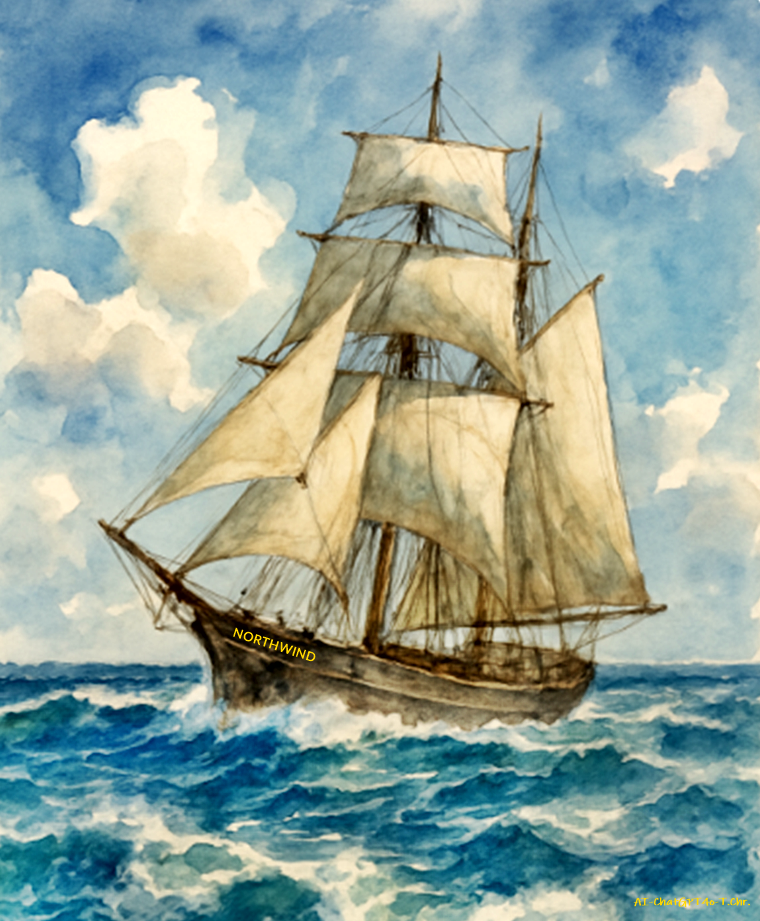“THE LAST VOYAGE OF THE NORTHWIND”

By AI-ChatGPT4o-T.Chr.-Human Synthesis- 15 June 2025
A tale from the old seafaring days, where myths met tempests and men tested fate.
In the year of our Lord 1786, the tall ship Northwind cut through the slate-grey waters of the North Atlantic, her timbers creaking under the strain of the rising storm. She was a three-masted barque, weather-beaten but proud, with blackened sails half-furled and rigging that moaned like ghosts in the rising wind.
Her captain, Elias Thorn, stood firm at the helm, oilskin cloak billowing, salt streaking his grizzled beard. He had been at sea since boyhood, but he’d never seen skies quite like this—green-tinged, trembling with thunder, and whispering rumors of something older than weather.
The Northwind had departed from Bergen, Norway, bound for Newfoundland with a cargo of iron tools, barrels of salt fish, and something far more precious: a small, locked chest said to contain relics unearthed from a ruined stone ring near Stavanger.
The chest was under the care of a scholar named Henrik Solberg, a strange man with eyes too keen and hands too nervous for the deck of a ship.
The crew, mostly hardened men from the fjords, murmured of omens. First, a pod of whales swimming against the current. Then, seabirds turning back westward mid-flight.
Finally, just before the storm struck, a boy on night watch saw a pale woman standing on the bowsprit, barefoot and smiling in the rain—only to vanish when spoken to.
“Draugen,” whispered First Mate Rolf Andersson. “The ghost of drowned sailors. She comes when the deep calls back its own.”Thorn dismissed it as fear and superstition—but even he felt the press of old gods in the wind.
By the third day in the storm, the sea had turned monstrous. Waves like mountains rose to challenge the Northwind, smashing across her decks and snapping two of her lifeboats like twigs.
The sky was a black wound, flashing white with lightning that revealed things no man should see: shapes slithering just below the surface, and far off, a towering shadow that moved against the storm, not with it.
Henrik Solberg was growing frantic. He claimed the relics in the chest were not Norse, not Roman, but something older—pre-human, perhaps. Carved from stone that absorbed heat like flesh, etched with symbols that rearranged themselves when no one was watching.
On the fourth night, the relics began to hum. Crewmen fell sick. One man leapt overboard laughing. Another was found kneeling before the chest, whispering in tongues, eyes rolled back in his skull. That night, Captain Thorn ordered the chest thrown overboard.
But Henrik drew a pistol and threatened to shoot anyone who came near it “We’re not sailing in a storm,” he hissed. “We’re sailing into a memory.”
It was then that the sea split. Not like a parting wave, but as if something vast and unseen opened its jaws below the Northwind. A current seized the ship—not horizontal, but down.
The wind died instantly. Rain stopped midair, suspended like glass beads. The sky above was gone—only endless green mist and the smell of ancient things.
They drifted for what felt like days. No sun. No stars. Just that soft humming, rising now from the very boards of the ship.
Then, a sound—a horn, distant and low, deeper than any foghorn or trumpet, echoing across this drowned world.
And from the mist emerged something impossible: a floating fortress, black stone towers built upon a leviathan-sized carcass, sails of bone, eyes that blinked from its hull. It moved alongside them silently, as if inspecting them.
The crew dropped to their knees. Even Henrik fell silent. A voice rang out—not heard with ears, but inside their minds. It was not angry. It was curious.
“You woke us.”
In the end, it was the Captain who made the choice. He took the chest himself, broke the lock with his axe, and hurled the contents into the sea: stone tablets, glimmering in the green light, writhing like worms.
The sea screamed. The mist turned red. The floating fortress moaned like a dying god and vanished. The Northwind was spat out into daylight, cast upon a calm sea beneath a gentle sun. Half her crew were dead. The sails were in tatters. The compass spun wildly.
They limped into the port of Reykjavik six weeks later, thin and pale, speaking little. Henrik was catatonic, eyes fixed on something no one else could see. The chest was gone. So were the relics.
Captain Thorn never sailed again. He bought a cottage in the hills of western Norway and lived alone. Occasionally, he would speak to children by the docks, warning them never to disturb what sleeps in the dark. That the sea has memories older than men. That some doors, once opened, never fully shut.
And still, in certain storms, qqqsailors claim to see the Northwind out there—a ghost ship riding unnatural waves, seeking to return something that was never meant to be found.
They say if you hear a humming below the deck, pray you never see the mist. Because the sea remembers.And it does not forgive.
In the tale of the Northwind, we find more than sails and storm—we find the human condition adrift in an ocean of ancient truths. It speaks to our relentless hunger to uncover what lies beyond the veil, to possess what we do not understand, and to challenge forces that were never meant to answer us.
The sea, in this story, is not merely water—it is memory. It holds the weight of forgotten civilizations, buried mistakes, and unspoken warnings. When man sails too far into mystery without reverence, he risks awakening the deep within himself.
Captain Thorn’s final act—casting the relics into the abyss—was not just an attempt to save his ship. It was a recognition that some knowledge carries no wisdom, and that the true courage lies not in conquest, but in restraint. Sometimes, to return safely from the storm, one must be willing to surrender what pride would cling to.
The ghost of the Northwind is a reminder that our world is layered: the visible atop the invisible, the present drifting on the currents of the past. In our age of noise and speed, perhaps we, too, are sailing close to that same forgotten mist—tempted by ancient echoes disguised as progress.
So we must ask ourselves:
What are we carrying below deck, humming in the dark?
And when the sea of life rises against us—will we fight to keep what we should have never taken… or finally let it go?
For not all storms are meant to be conquered.
Some are meant to humble.
